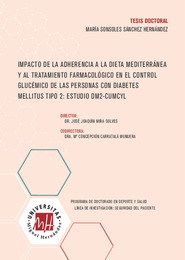Resumen :
Objetivo: Este estudio tuvo como objetivo analizar los determinantes de la
adherencia terapéutica y del control glucémico en personas con diabetes mellitus
tipo 2.
Materiales y Métodos: Estudio transversal multicéntrico, realizado en pacientes
con diabetes mellitus tipo 2 diagnosticada, reclutados por los equipos
de atención primaria en Castilla y León (España). Se recogieron, en un cuestionario
autoadministrado, las características sociodemográficas y clínicas de los
pacientes, incluyendo la escala de adherencia al tratamiento de Morisky-Green
(MMAS-4), y el cuestionario de 14 puntos de adherencia a la dieta Mediterranea.
Se realizó un análisis bivariable y multivariable para analizar la falta de
adherencia a la medicación y el control glucémico deficiente.
Resultados: De los 3.536 pacientes, el 33,8% resultó no adherente al tratamiento
farmacológico, y el 33,7% tuvo un control glucémico deficiente (HbA1c
≥58 mmol/mol [7,5%]); el 50,6% indicó tener una adherencia moderada-alta a
la dieta mediterránea (≥9 puntos). El modelo de regresión logística multivariable
mostró que el nivel educativo (OR 0,73; IC 95% 0,61-0,87; p<0,001) y el sedentarismo
(OR 1,64; IC 95% 1,36-1,98; p<0,001) estaban asociados a una falta
de adherencia. Menor edad, residencia rural, hábito tabáquico, tiempo desde el diagnóstico (OR 1,04; IC 95%; 1,03-1,05; p<0.001) y la polifarmacia se asociaron
con un control glucémico deficiente.
Conclusiones: El menor nivel educativo y el sedentarismo se asociaron a una
falta de adherencia. Menor edad, residencia rural, el hábito tabáquico, el tiempo
desde el diagnóstico y la polifarmacia incrementan el riesgo de un control
glucémico deficiente.
Aims: This study aimed to analyze the determinants of therapeutic adherence
and glycemic control in people with type 2 diabetes mellitus.
Methods: Multicentre, cross-sectional study in patients with type 2 diabetes
mellitus recruited by primary care professionals in Castilla y León (Spain).
Sociodemographic and clinical characteristics were reflected in self-reported
questionnaire, which included the Morisky-Green Medication Adherence Scale
and the 14-point Mediterranean Diet Adherence Screener. Medication non-adherence
and poor glycaemic control were analysed by bivariable and multivariable
analyses.
Results: Of 3536 included patients, the 33.8% reported non-adherence to
pharmacological treatment, and the 33.7% had poor glycaemic control (HbA1c
≥ 58 mmol/mol [7.5%]); 50.6% of patients reported moderate-high adherence
to the Mediterranean diet (≥9 points). The multivariable logistic regression
model showed that educational level (OR 0.73; 95% CI 0.61-0.87; p<0.001)
and sedentarism (OR 1.64; 95% CI 1.36-1.98; p<0.001) were associate with low
adherence. Younger age, rural residence, smoking, time since diagnosis (OR
1.04; 95% CI 1.03-1.05; p<0.001) and polypharmacy were associated with poor
glycaemic control. Conclusion: Lower educational level and sedentarism were associated with
low adherence. Younger age, rural residence, smoking, time since diagnosis and
polypharmacy, increased risk of poor glycaemic control.
|
 La licencia se describe como: Atribución-NonComercial-NoDerivada 4.0 Internacional.
La licencia se describe como: Atribución-NonComercial-NoDerivada 4.0 Internacional.
.png)
